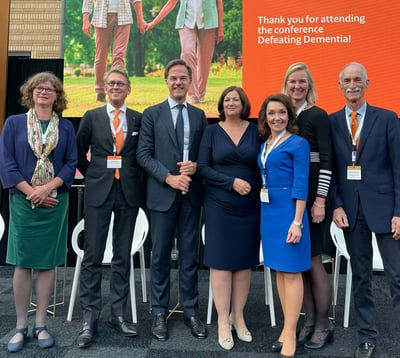 Famed Rhode Island Alzheimer’s Researcher Addresses Global Conference with 6 Goals for Ending Alzheimer’s"
class="bg-img"
fetchpriority="high"
loading="eager"
decoding="async">
Famed Rhode Island Alzheimer’s Researcher Addresses Global Conference with 6 Goals for Ending Alzheimer’s"
class="bg-img"
fetchpriority="high"
loading="eager"
decoding="async">

(From left to right: Professor Charlotte Teunissen, Sir Philip Scheltens, Prime Minister Mark Rutte, Health Minister Connie Held, Professor Mia Kivipelto, Professor Wiesje van der Flier, and Dr. Stephen Salloway)
Founding director of the Memory and Aging Program (MAP) at Butler Hospital, Dr. Stephen Salloway, gave the keynote speech to open the “Defeating Dementia” conference on October 2, 2023. This global conference of government and health leaders addressed the challenges dementia poses to society and the swift progress that can be made in care delivery, diagnosis, and drug discovery through unified, concrete actions and public investment in dementia research.
The meeting in Amsterdam emphasized discovery science, implementation of advances and new technologies, and dignity and inclusion for people living with dementia. A proclamation, signed by more than 30 countries, with a commitment to increase research funding and collaboration, was announced at the end of the meeting.
In his address to global policymakers, patient advocates, and dementia experts, Dr. Salloway shared his thoughts on what he believes are the six (6) great challenges to addressing the increasing epidemic of Alzheimer’s around the globe today.
Those include:
“We now know that brain changes in Alzheimer's disease begin decades before memory loss. What's most remarkable is that we have new blood tests to measure amyloid and tau that can be used now to pre-screen for the new disease-modifying treatments to identify people who are eligible for clinical trials and for diagnosis in memory clinics,” Dr. Salloway said. “It's not just the medicine, it's the whole package of care that's required. It's very important for health systems who are thinking about this [to understand] there will be some challenges and some change needed in the standard of care… The challenge will be building the infrastructure and workforce to roll these treatments out safely.”
Dr. Salloway also highlighted the major recent advances in understanding AD prevention.
“Equally important is risk modification and prevention,” Dr. Salloway said. “The new biomarkers have helped open a new era of Alzheimer's prevention research and we're also learning that 40% of the risk of dementia may be modifiable through lifestyle interventions such as good heart health, exercise, healthy diets, social and cognitive stimulation.”
Maria Carrillo, VP for Research of the Alzheimer’s Association, announced that ALZ-NET, the research network to track the safety and efficacy of disease-modifying treatments, was extending participation in the network to countries around the world.
The Netherlands Health Minister, Connie Held, announced she will be leading a Dutch delegation to China to learn from the Chinese experience with dementia research and care and to build new collaborations. China currently has 280 million people aged 60 and older.
Prime Minister Mark Rutte of the Netherlands delivered the conference’s closing remarks.
Disclaimer: The content in this blog is for informational and educational purposes only and should not serve as medical advice, consultation, or diagnosis. If you have a medical concern, please consult your healthcare provider or seek immediate medical treatment.
Copyright © 2026 Care New England Health System